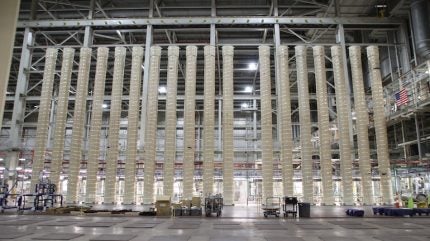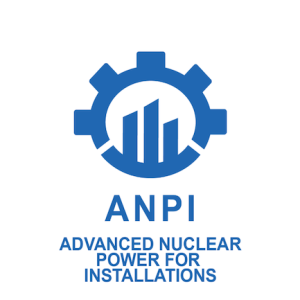
US Centrus Energy Corp reported significant progress in its 2024 financial report. However, there are question marks over future developments related to uncertainties over future DOE funding in view of investigations by President Donald Trump’s new Department of Government Efficiency, and waivers for essential imports of enriched uranium from Russia.
Centrus President & CEO Amir Vexler said the company “expanded our backlog, demonstrated the success of our technology by continuing first-of-a-kind HALEU production, and restarted centrifuge manufacturing activities.” Centrus is producing high-assay low-enriched uranium (HALEU) at its American Centrifuge Operating (ACO) Plant in Piketon, Ohio, under a HALEU Operation Contract with the Department of Energy (DOE).
“At the same time, we secured new government contracts, made contingent sales of approximately $2bn in contracts and commitments, and obtained private financing that will help underpin a potential expansion of our enrichment plant in Ohio,” he noted. “As the only US-owned, US-technology enrichment company, we are well-positioned to compete for more than $3.4bn in federal funding that has been approved by Congress and uniquely positioned to deliver a made-in-America solution that supports American jobs.”
He added: “This progress comes amid rising momentum for the entire nuclear industry, from the void that will need to be filled starting in 2028 stemming from Congress’s enriched uranium ban to mothballed reactors coming back online, as well as from technology companies looking to power tomorrow’s data centres and AI technologies. We look forward to meeting these vital needs in the years to come.”
In 2024, Centrus secured more than $2bn in contingent purchase commitments from customers to support future production of low-enriched uranium (LEU), as well as two awards from DOE aimed at enrichment and deconversion of HALEU. In November, Centrus said it was resuming centrifuge manufacturing activities and expanding its manufacturing capacity at its Oak Ridge facility in Tennessee, which manufactures its centrifuge equipment to support a potential large-scale expansion of uranium enrichment at its Plant in Piketon.
Vexlar said the investment would jump-start “what we hope will be a multi-billion dollar public and private commitment to reestablishing America’s uranium enrichment capacity at scale while reducing our dependence on foreign nations – deploying American technology, built by American workers, supported by an American supply chain.”
He added: “We have always said that restoring US enrichment capacity at scale requires a public-private partnership, including a robust federal investment alongside customer offtake commitments and private capital. This additional investment by Centrus reflects our continued willingness to step up to the plate in such a partnership.” However, Centrus’s American Centrifuge technology is not yet operating on a commercial scale. Currently, the only operating commercial uranium enrichment capacity in the USA is the Urenco USA (UUSA) plant at Eunice in New Mexico.
According to the financial report. Centrus has applied for a clean energy manufacturing and recycling project associated with re-equipping of the Oak Ridge facility. “This will recreate a viable enrichment supply chain and allow ACO to manufacture centrifuge parts to be used in centrifuge machines to enrich uranium.” The application requested an allocation of $62.4m and the $208.0 million made by Centrus. On January 10, 2025, the Company was informed Internal Revenue Service agreed to the request. “Centrus now has two years to provide evidence that the requirements of the credit have been met, thus certifying our credit allocation…. We then have two years from that date to notify the DOE that the qualified investment in eligible property is placed in service to receive the credit allocation.”
The financial report said Centrus has now delivered approximately 545 kg of HALEU UF6 to DOE and the HALEU Operation Contract has been modified to extend the Phase 2 period of performance to 30 June 2025. The two DOE HALEU contracts and one LEU contract are backed in aggregate by more than $3.4bn in appropriations provided by Congress including $700m appropriated through the 2022 Inflation Reduction Act (IRA). However, a recent Executive Order from President Donald Trump directed all government executive agencies to pause the distribution of all funding appropriated under the IRA for further review. Centrus noted: “The timing and outcome of such review is uncertain.”
Imports of LEU from Russia into the USA have been banned since August 2024 and the general licence of Rosatom subsidiary Tenex to export LEU to the USA was rescinded by a Russian federal decree in November. Centrus therefore requires waivers from DOE to import the material it needs to meet current orders and Tenex now has to obtain a specific export licence from the Russian authorities for each shipment to Centrus.
Centrus reported that in July 2024 DOE issued a waiver allowing it to import LEU from Russia for deliveries already committed by the Company to its US customers in 2024 and 2025. For 2026 and 2027, DOE deferred its decision to an unspecified date closer in time to the deliveries. In October DOE issued the Company a second waiver allowing it to import LEU from Russia “for the importation of such material to our foreign customers scheduled in 2025”. In December Centrus filed a third waiver request for 2026 and 2027 “to meet the expected requirements of the US nuclear industry”. It noted: “It is uncertain whether any further waivers will be granted to the Company and, if granted, whether any waiver would be granted in a timely manner or will be sufficient in scope to support the Company’s intended operations.”
As to Tenex, Centrus said in its report that it had been informed that Tenex had “received three specific licences, to date, which allow Tenex to export LEU to us.” It added: “Centrus will use the majority of this LEU to satisfy pending orders to a single customer on a delayed basis in reliance on its contractual rights.” Tenex has informed Centrus of its plan to seek additional export licences to meet its contractual obligations for pending and future orders. “However, there is no certainty whether additional licences will be issued by the Russian authorities and if issued, whether they will be issued in a timely manner or rescinded prior to the shipment taking place,” Centrus noted.






